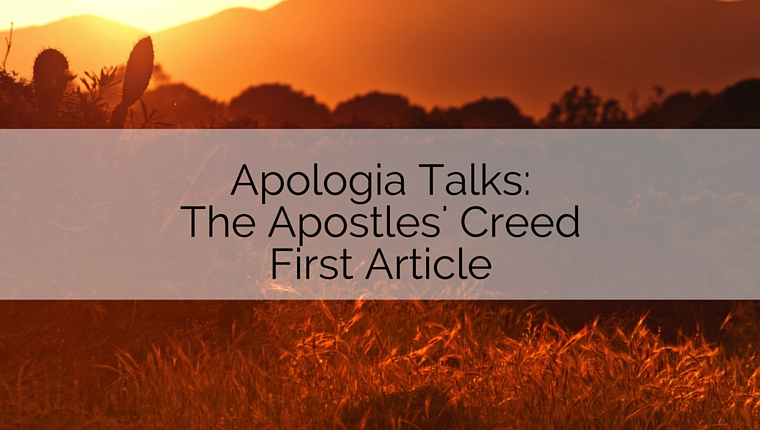Download a PDF of the Conversation Guide for the Apostles’ Creed First Article.
I believe in God, the Father Almighty, Maker [Creator] of heaven and earth.
Introduction to the Apostles’ Creed
The Apostles’ Creed was first formed in approximately the year 150 and was known as “symbol of the faith.” Historically, “symbol” meant the token that a messenger took with him or her to prove themselves to be a trustworthy source. When you say the words of the Apostles’ Creed you recognize yourself as a believer of what the creed says. The Apostles’ Creed is the most common creed used in western Christianity. Some Christian denominations do not use creeds, typically because the common creeds used by churches are not found as whole statements in Scripture, yet all parts of the creeds are Scripturally based. Creeds are a summary of Christian doctrine. Each article starts with “I” and not “We” because of its use as a baptismal creed. The Apostles’ Creed is deeply personal. What this creed and others allude in its structure is that Christians believe in the only true triune God – Father, Son, and Holy Spirit. The three articles of the Creed correspond to the three works of God: creation, redemption and sanctification. They also correspond to the three Persons of the Trinity, though in such a way that the external works of God remain indivisible. Other creeds get more specific on how the Bible has been interpreted and its statements about the Holy Trinity. Think of the Apostles’ Creed as a doctrine 101 of the Christian Church.
What the Creed does for us: To know Him perfectly, to know how to obtain the strength to carry out the 10 Commandments, a response and confession of Christians based on the first commandment… (The Large Catechism)
Here in the Creed you have the entire essence, will, and work of God exquisitely depicted in very brief but rich words. (The Large Catechism)
Introduction to the 1st Article
In such a short sentence there is so much! This article has been known as the creation or God the Father. The first article is an announcement that you believe there is nothing in the spiritual or material world that God does not rule over. Within this statement you are saying that you believe all of the following: God made man and all of creation including the angels (we sometimes forget that we believe in angels and demons), humanity originally possessed God’s image and lost it, and God still takes care of me and all of creation. Identity formation is a big part of human development. This article and the others point to where your identity rests as a child of God. Where you seek to form your identity has already been accomplished – bask in the creator of this world, knowing that He has restored His image on you through His Son and rescued humanity’s captivity to Sin and Death (2nd Article) and that the accomplished work of Christ is made yours by the Holy Spirit working through the Word (3rd Article). The Large Catechism places the work of creation under God’s fatherhood. God is not only Maker, but also Provider and Protector. This He does solely out of fatherly goodness and mercy, without any merit or worthiness on our part. As such, it is not only Law but also unmerited gift that indicates God’s goodness and mercy.
Scripture Connect
- Genesis 1:1- In the beginning God created the heavens and the earth.
- Psalm 33:6, 9 – By the word of the Lord were the heavens made, their starry host by the breath of His mouth…For He spoke, and it came to be; He commanded, and it stood firm.
- Malachi 2:10 – Have we not all one Father? Did not one God create us?
- Psalm 118:1 – Give thanks to the Lord, for He is good; His love endures forever.
- Matthew 10:29-30 – Are not two sparrows sold for a penny? Yet not one of them will fall to the ground apart from the will of the Father. And even the very hairs on your head are all numbered.
- John 20:17 – I [Jesus] am returning to My Father and your Father, to My God and your God.
- 2 Corinthians 12:9 – But He [God] said to me, “My grace is sufficient for you, for my power is made perfect in weakness.” Therefore I will boast all the more gladly about my weaknesses, so that Christ’s power may rest on me.
- Romans 8:28 – We know that in all things God works for the good of those who love Him, who have been called according to His purpose.
Doctrinal Quotation
- What does this mean? I believe that God has made me and all creatures; that He has given me my body and soul, eyes, ears, and all my members, my reason and all my senses, and still takes care of them. He also gives me clothing and shoes, food and drink, house and home, wife and children, land, animals, and all I have. He richly and daily provides me with all that I need to support this body and life. He defends me against all danger and guards and protects me from all evil. All this He does only out of fatherly, divine goodness and mercy, without any merit or worthiness in me. For all this it is my duty to thank and praise, serve and obey Him. This is most certainly true. – Luther’s Small Catechism
- We learn from this article that none of us has life – or anything else that has been mentioned here or can be mentioned – from ourselves, nor can we by ourselves preserve any of them, however small and unimportant. – Large Catechism: The Creed
- You can hold such promises up to him [God] and say, “Here I come, dear Father, and pray not of my own accord no because of my own worthiness, but at your commandment and promise, which cannot fail or deceive me”…. God takes the initiative and puts into our mouths the very words and approach we are to use. – Large Catechism: The Lord’s Prayer
Application
You know what is pretty awesome? You have a perfect father eagerly taking care of you, who wishes to hear from you and who wants to see you making a difference in the world through the abilities He has blessed you with. No matter how great or lousy your earthly father is or was, there is an eternal God who desires for you to call Him Father. We know this because He calls us in Baptism to be a part of His family. He revealed Jesus Christ to be His Son in His Baptism. Think about how God the Father wants you to receive Him and respond to Him. He is the one who has provided us with gifts, talents and abilities.
Alongside the good news of God as protector and preserver over all of creation and each believer, we find the Law as the first article in particular calls us to examine ourselves. Remember this is the God who spoke the world into being. We should fear and love God. Each of us slacks in our duties as priests over creation in prayer, praise and thanksgiving as well as priestly stewardship over creation.
We also may not give glory to God when it is due. If there are things you are really good at – don’t boast, swagger, brag – because you have then failed to confess the first article. For those of you who are particularly proud of your accomplishments, how could you refocus on God the Father’s almighty power in and around your life? Maybe you’re not a boasting out loud type. If you find yourself becoming annoyed with someone who is, you need to check yourself. There may be some internal boasting happening.
As mentioned in the introduction, you are confessing God as creator of all. In Genesis, God gives us the priestly stewardship of creation, meaning it is your job to take care of the environment. What are you doing to protect this great big world God has given us for a little while?
The first article is also humbling. God chooses you over and over again despite your failings and successes. God is your provider both in the things He blesses you with and the things He prevents that are not in your benefit.
References
Gonzalez, J. L. (1984). The Story of Christianity (Vol. 1: The Early Church to the Dawn of the Reformation). New York, NY: HarperOne Publishing.
Kolb, R., & Wengert, T.J. (2000). The Book of Concord: The Confessions of the Evangelical Lutheran Church. Minneapolis, MN: Fortress Press
Luther’s Small Catechism with Explanation. St. Louis, MO: Concordia Publishing House






0 Comments